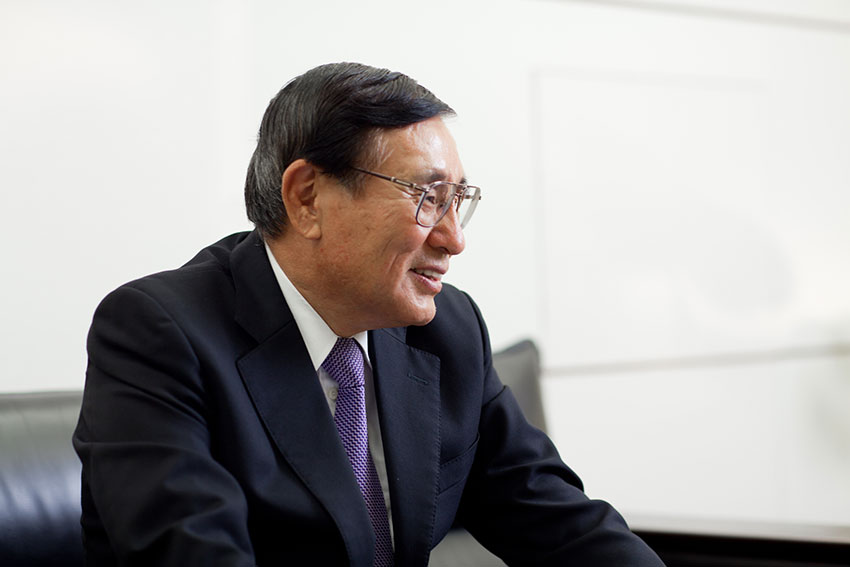Since its establishment, Japanese firm ALCONIX has continuously been evolving by adapting and providing high-quality Light Metals and Copper Products, Electronic and Functional Materials, Non-Ferrous Raw Materials, and Construction and Industrial Materials, among others. Eiitsu Masaki, President and CEO of ALCONIX, speaks about the company’s operations, as well as his visionary plans for the future

Could you tell us how ALCONIX has evolved over these years and the core products and solutions it provides?
ALCONIX started as a subsidiary company under the non-ferrous metals division of Nissho Iwai Corporation. After trading rights for non-ferrous metal products were transferred from Nissho-Iwai in April 2000, ALCONIX joined forces with Mizuho Capital, and an MBO (Management Buy Out) was implemented in April 2001.
Since 2004, we have acquired nine trading and six manufacturing companies. These acquisitions allowed our annual revenue in sales to reach 200 billion yen per year ($1.8 billion) with an ordinary profit of 5 billion yen. Our business forecast for FY2017 (Financial Year, ending on March 31, 2018) is that sales of manufacturing companies will merely represent 15 percent of the total gross sales. Yet, the ordinary profit will reach 64 percent of such total. This mirrors the success of purchasing manufacturing companies. And despite the fact that the trading component represents the majority of our business, profits come essentially from manufacturing.
In a matter of years, ALCONIX has grown into one of the industry’s major corporate groups. We believe that this growth comes from our successes in: 1) conducting strategic M&A, 2) engaging into aggressive business investments, and 3) fostering and keeping employees with highly specialized expertise. All employees of ALCONIX have been taught to overcome difficulties by cooperating with one another, to lead development of working towards our common goal. That is why ALCONIX has been able to continue to grow and I believe it is our mission to contribute both to the company and our society.
Can you tell us more about your international strategy and about the role of Asia within that strategy?
In accordance with the changing economic environment, globalization has become inevitable. Our customers face various kinds of trouble when penetrating overseas markets. These problems are caused by socio-cultural paradigms, such as language barriers, varying business cultures, ways of life etc. Thanks to our unique global expertise and our extensive overseas network, we are able to provide solutions to our clients’ international expansion plans. Now, about 60 percent of our 200-billion-yen turnover comes from foreign trade, and this figure will continuously increase in the future.
ALCONIX has 11 local subsidiaries: five are located in China; four are located in South East Asia (SEA), in Thailand, Malaysia, Singapore and Vietnam; one is located in the U.S.A; and the remaining one is located Germany.
Most Japanese manufacturers expand into SEA countries to establish local factories and to start selling from there. It is a local endeavor with no export coming from Japan. Because SEA does not require traders such as ALCONIX, growth in the region will come from the creation of factories and manufacturing bases. Additionally, the local demand does not require high-tech products or high added-value solutions at the present stage, so we can’t really expect increasing our exports of high-tech products from Japan to the region.
However, China poses a different scenario. We have started manufacturing sophisticated products for the Chinese market. We now have five entities in China and we are further building our local footprint. For us, SEA and China fit into two distinct categories.
Going back to SEA, we understand that commodities trading is not a sustainable business practice. We therefore started working closer with local communities. Investing in local manufacturing companies and collecting the profits from the products we forward them represents great business potential. The model we are implementing in SEA countries aims at lessening the importance of Japanese production by promoting local domestic trade to increase regional independence. From an investor’s perspective, SEA is a reliable region for investments. At ALCONIX, our objective is to spread the quality of our “Monozukuri”.
How does the future look like for ALCONIX?
I have an acute sense for profitable opportunities and I have a visionary dream for the future. Currently, we are witnessing that owners of the manufacturing companies are getting older. Without withstanding the fact that they have the technology, that they have done all the research and development, and that they have become knowledgeable and successful in creating a profitable momentum for their companies; there is no one who could succeed the ownership of the companies.
Well, I want to step in, buy those companies, reshuffle their capacity and portfolio to create an extensive high-potential corporate group made out of Japan’s best assets. Because ALCONIX started as a trading company, we have the knowledge about that business. The strategy we want to adopt is to acquire manufacturing companies with no successors and reorganize the manufacturing industry.
0 COMMENTS